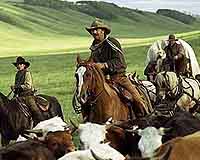 Kevin Costner ('Open Range')
Kevin Costner ('Open Range')
’The ABC’s of Making A Western Revealed’
Kevin was born in Lynwood, California on January 18, 1955, the third child of Bill Costner, a ditch digger and ultimately an electric line servicer for Southern California Edison, and Sharon. His Dad's job required him to move regularly, which caused Kevin to feel like an Army kid, always the new kid at school, which led to him being a daydreamer. As a teen he sang in the Baptist church choir, wrote poetry, and took writing classes. At 18, he built his own canoe and paddled his way down the rivers that Lewis & Clark followed to the Pacific. Despite his present height, he was only 5'2" when he graduated high school.
Nonetheless, he still managed to be a basketball, football, and baseball star. In 1973, he enrolled at California State University at Fullerton, where he majored in business. During that period, Kevin decided to take acting lessons five nights a week. He graduated with a business degree in 1978 and married his college sweetheart, Cindy Silva. He initially took a marketing job in Orange County. Everything changed when he accidentally met Richard Burton on a flight from Mexico. Burton advised him to go completely after acting if that is what he wanted. He quit his job and moved to Hollywood soon after.
He drove a truck, worked on a deep sea fishing boat, and gave bus tours to stars' homes before finally making his own way into the films. After making one soft core sex film, he vowed to not work again if that was the only work he could do. He didn't work for nearly six years, while he waited for a proper break. That break came with ’The Big Chill’ where he was remembered by director Lawrence Kasdan when he decided to make ’Silverado’.
Since that point in time Costner has gone on to make a veritable slew of films including ’The Untouchables,’ ‘No Way Out,’ ‘Bull Durham,’ and such ‘new cult classics’ as ‘Field of Dreams,’ ‘Dances With Wolves,’ ‘Robin Hood: Prince of Thieves’ and both ’Waterworld’ and ’Thirteen Days’.
His latest is the western ’Open Range,’ which tells the tale of four men (Kevin Costner, Robert Duvall, Diego Luna, and Abraham Benrubi) living in the Wild West who band together to rid their town of a rancher who's created an outlaw principality using brute force and scare tactics. Annette Bening plays Costner's love interest.
 Chatting one-on-one with the movie legend himself, I first wondered why he would have chosen another western in today’s ‘sequel-plagued’ society? ”I really don’t think about what other people are doing. I was looking for the next great movie, or at least hoping it would be great and this western came along. And, at first I rejected it because while it was good and caught my attention there was a lot of work that I felt would need to happen in order to attract me and in order to attract the other actors. The kind of actors that I would want to have play. So, I was kind of a bit of a baby about it, saying that I didn’t want to do this ‘cause it would take a lot of work. Then, I started working on two westerns simultaneously, this one and ‘Horizon’ in terms of the writing. I worked every day as a writer and then five months later I decided I would do it. So, I sent it to Robert [Duvall] and Annette [Bening] and they both said yes the first day they got it and that’s really only down to the power of writing. But that’s a little against the grain because really what people try to do is they go out and try and get the actors first regardless of what the script is and suddenly they have a package. And whether that script ever gets read or not, it’s the people that hold the package together and that’s what we see. That’s why people have a lot of these escape clauses in movies these days,” he laughs.
Chatting one-on-one with the movie legend himself, I first wondered why he would have chosen another western in today’s ‘sequel-plagued’ society? ”I really don’t think about what other people are doing. I was looking for the next great movie, or at least hoping it would be great and this western came along. And, at first I rejected it because while it was good and caught my attention there was a lot of work that I felt would need to happen in order to attract me and in order to attract the other actors. The kind of actors that I would want to have play. So, I was kind of a bit of a baby about it, saying that I didn’t want to do this ‘cause it would take a lot of work. Then, I started working on two westerns simultaneously, this one and ‘Horizon’ in terms of the writing. I worked every day as a writer and then five months later I decided I would do it. So, I sent it to Robert [Duvall] and Annette [Bening] and they both said yes the first day they got it and that’s really only down to the power of writing. But that’s a little against the grain because really what people try to do is they go out and try and get the actors first regardless of what the script is and suddenly they have a package. And whether that script ever gets read or not, it’s the people that hold the package together and that’s what we see. That’s why people have a lot of these escape clauses in movies these days,” he laughs.
Tell me more about this other western you mentioned, ‘Horizon’ ”If I find a story that I think is great, I start to fashion it and this was just a while back and is just another western that I would like to do. It’s probably a bigger marquee western and will probably use actors in all the different demographics that exist. So, there’ll be this nice red carpet thing going on. ‘Open Range’ is just me, Bobby and Annette, you know,” he laughs. ”So, it’ll have a bigger cast and is a more commercial venture, but no less important to me. But, I know exactly what it is too – it’s not ‘Open Range’ it’s another kind of western.”
Growing up you got a marketing job at 22 which you quit it in 2 weeks, and did odd jobs such as delivery truck driver, crate packer in an Ice-house and even a Tour Bus guide in Bel-Air … and yet you turned out to be this big, hugely successful movie star! But, when do you feel that all the pieces really began to fit? ”Yeah, I was a fisherman and a lot of other things, and I enjoyed my life, but I know when it turned for me. In fact, there was probably two turns. One was the simple decision that I was gonna become an actor which sent shock waves through my family and through everyone that knew me. Because at that moment they all thought that maybe I wouldn’t make it because that’s a very big possibility with the acting thing. But that was a big relief for me emotionally that I could at least come to that decision at that time and know that that was what I wanted to be. Because, I went for seven years without making any money in the acting business, but I was able to do all these other jobs because I liked working! The second moment was probably Lawrence Kasdan after being in ‘The Big Chill.’ That was a very big break for me and I will always point at that. So, if I give you the touchstones of what were the two most important to me, then those were them. Sometimes, people look at what the obvious thing is and they pivot off that and maybe that’s the easiest thing to do, but people don’t often wanna put my life in reverse. They see me where I’m at and they don’t understand that at University my first job was $5.50 an-hour and it stayed that way for about seven years. That’s not what you call a career move. I was working my way down the pay scale and if I didn’t know it, I found out about it at the Christmas parties and the New Year’s Eve parties where I would run into my friends that I went to college with. People who were on their second job and in their second home of which I had nothing. But I always felt happy!”
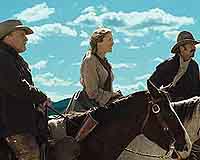 Why change the character’s age you play from the original one in the book? ”Well, I never read the book so I didn’t know. When I was first approached it wasn’t explained to me that it was an adaptation. My main concern was fixing the parts that bothered me, because there were certain elements that I liked. There were words going in different people’s mouths and they weren’t dealing with the gunfight and the lead up or how it eventually happened. I actually heard about the different age of the original character from another person, but I didn’t read the book even then because I felt like I was already moving forward with the direction of behavior. And that’s really when I tried to lock myself in because I knew I was going to get to that gunfight, but I wanted to make sure that these people resonated in some way. And were not boring. I don’t feel like it’s my responsibility to prop up a character. I just believe in the character. I just believe that it should be entertaining. I’m not trying to be the vanguard of anything. I have a style and hopefully every director that works has a style and that’s the trouble with a lot of conventional movies you don’t exactly get to feel their personalities. You don’t feel their explosions or their tempo. It’s just like techno music. You can pretty much just dance to all of it, but that’s not enough and I can’t make those kind of movies and I’m not impressed by them. I’m not a green screen person,”he laughs.
Why change the character’s age you play from the original one in the book? ”Well, I never read the book so I didn’t know. When I was first approached it wasn’t explained to me that it was an adaptation. My main concern was fixing the parts that bothered me, because there were certain elements that I liked. There were words going in different people’s mouths and they weren’t dealing with the gunfight and the lead up or how it eventually happened. I actually heard about the different age of the original character from another person, but I didn’t read the book even then because I felt like I was already moving forward with the direction of behavior. And that’s really when I tried to lock myself in because I knew I was going to get to that gunfight, but I wanted to make sure that these people resonated in some way. And were not boring. I don’t feel like it’s my responsibility to prop up a character. I just believe in the character. I just believe that it should be entertaining. I’m not trying to be the vanguard of anything. I have a style and hopefully every director that works has a style and that’s the trouble with a lot of conventional movies you don’t exactly get to feel their personalities. You don’t feel their explosions or their tempo. It’s just like techno music. You can pretty much just dance to all of it, but that’s not enough and I can’t make those kind of movies and I’m not impressed by them. I’m not a green screen person,”he laughs.
What is it about green screens you dislike so much?! ”I mean, they’re always breaking new ground with it, but every time that I actually try and use green screens I have somebody who’s gonna smoke and they’ve said, ‘Oh no, you can’t smoke cigarettes in front of it’! I’m like ‘Why’? I mean, these f**kers are sinking ships and going to Mars, and things are flying all around us and did you see ‘Twister,’ … and I can’t have a guy smoke a cigarette in front of the damn things! So, I’m like f**k it, I’ll just wait for our sunset and we’ll have our campfire!”
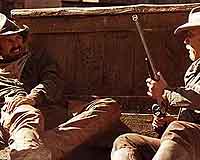 Tell me more about the way you wanted this movie to come across and what you did to ensure that ”Unfortunately, it’s a genre that threatens to bore and most of the time it does. It can sometimes be just a costume party with hats, stubble, facial hair and guns and perhaps women with corsets and no wonder people think they’re boring because the ones on television ARE boring for the most part,” he laughs. ”That’s not to say that classic movies haven’t been made, but in my mind not a lot have been made because it’s a difficult genre. Because the easiest thing in the world is to put the white hat or the black hat on somebody or to start a movie with a man’s family slaughtered which gives him the right to go through the whole movie killing and exacting his revenge. And while we understand those themes, they’re a little bit simple and eventually they play out for us.”
Tell me more about the way you wanted this movie to come across and what you did to ensure that ”Unfortunately, it’s a genre that threatens to bore and most of the time it does. It can sometimes be just a costume party with hats, stubble, facial hair and guns and perhaps women with corsets and no wonder people think they’re boring because the ones on television ARE boring for the most part,” he laughs. ”That’s not to say that classic movies haven’t been made, but in my mind not a lot have been made because it’s a difficult genre. Because the easiest thing in the world is to put the white hat or the black hat on somebody or to start a movie with a man’s family slaughtered which gives him the right to go through the whole movie killing and exacting his revenge. And while we understand those themes, they’re a little bit simple and eventually they play out for us.”
”In reality, I know these movies have to be entertaining and I know that these movies have to lead up to a big gun fight, without a doubt, because if they don’t you’ve made a mistake. If I think I can just make a movie without those certain elements that’s just not true. It’s a difficult genre that we probably won’t see more of unless people make good ones and that’s what I hope I have done. This is more our ancestral past and our oldest genre and so has to be done right or not at all.”
”I see things different and I’ve always just enjoyed the different genres that exist out there and I’m not afraid to dabble in them as an actor or a director. I thought that I wanted to continue to put my stamp on the American western. In this particular instance made with the nuances of friendship and of violence. I wanted specifically to show how I perceive violence in the West. I am in love with scenes like digging out the wagon and inside the wagon I’m happy to see a young boy dicking around, which young boys do. So, I find if you deal with the reality of the rain and the wagon getting stuck, there’s a true reality there. I find if you take it a step farther you have the boy playing with the dog, you have the ages that we all recognize. And I think that can be just as entertaining as a crash or something like that. I like to play with the conventions of kicking the boy in the water and thinking that that’s about making him smell better. When, in fact, it was all about him cheating at cards!”
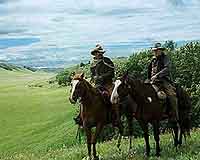 ”It’s not a glamorous thing as they live in the rain, but violence for me, when I say that I wanted to put my own stamp on it and break with some of the conventions that I had see, would be the notion of a town clearing out. Because traditionally that fight would happen and tumbleweeds would go down the road and I’m not sure where the tumbleweed went or the people,” he laughs again. ”I believe absolutely in the notion that those towns are empty and anyone with a clue is gonna get the hell out of there! But what I was interested in was the exodus where the greater majority of the people say that this is not their fight. We’re not cowards, but this is just not our fight and we’re not gonna get in harms way. And I believe that combatants aren’t the only ones that get hurt in a fight. I think that animals get hurt and buildings are shattered and children also. That’s just the way it really was and there are many ways to show just that.”
”It’s not a glamorous thing as they live in the rain, but violence for me, when I say that I wanted to put my own stamp on it and break with some of the conventions that I had see, would be the notion of a town clearing out. Because traditionally that fight would happen and tumbleweeds would go down the road and I’m not sure where the tumbleweed went or the people,” he laughs again. ”I believe absolutely in the notion that those towns are empty and anyone with a clue is gonna get the hell out of there! But what I was interested in was the exodus where the greater majority of the people say that this is not their fight. We’re not cowards, but this is just not our fight and we’re not gonna get in harms way. And I believe that combatants aren’t the only ones that get hurt in a fight. I think that animals get hurt and buildings are shattered and children also. That’s just the way it really was and there are many ways to show just that.”
”I believe in the chaos and I also believe in a survival instinct and I always make movies for men that I believe women can go to. I believe in the moments behind the writing, about the way things happened back then. In the West things moved a little slow, it doesn’t mean a movie has to, but the wagons did and they got stuck and had to be dug out! They didn’t live by a clock, they lived by their stomachs and that’s the staple of Westerns in American cinema and the context in which you do it.”
”I don’t want to call ‘Open range’ authentic, I wanted to make it authentic. That’s up to you to call that, ‘cause for me to call it authentic I’m setting myself up to be shot like that guy by the whore house. It’s a theatrical movie and there are conventions that we have to do but I start off with the idea that I want to make it authentic."
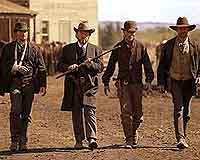 Explain your technique for the fight scenes ”I was not interested in doing a fight in slow motion and I wasn’t really interested in the blood aspect. And I wasn’t really interested in doing any close-ups. I feel that when people see violence they see bits and wisps of it, but they can tell from the movements that it’s violence. When Charlie kills the man who’s holding Sue, that’s almost like you’re in the fifth row and seeing this happen and even though you don’t see it perfectly in slow motion or in close-up, what you feel, I hope, is a violence. Almost a vulgar violence. It’s like 1-2-3 and the very last one is within point blank and it’s not what you’d call charactically heroic, in the classic sense of heroic, but what you feel is a man who has had a switch and he’s not interested in what people think anymore.”
Explain your technique for the fight scenes ”I was not interested in doing a fight in slow motion and I wasn’t really interested in the blood aspect. And I wasn’t really interested in doing any close-ups. I feel that when people see violence they see bits and wisps of it, but they can tell from the movements that it’s violence. When Charlie kills the man who’s holding Sue, that’s almost like you’re in the fifth row and seeing this happen and even though you don’t see it perfectly in slow motion or in close-up, what you feel, I hope, is a violence. Almost a vulgar violence. It’s like 1-2-3 and the very last one is within point blank and it’s not what you’d call charactically heroic, in the classic sense of heroic, but what you feel is a man who has had a switch and he’s not interested in what people think anymore.”
What were the first few westerns that really caught your eye growing up? ”Well, the first three or four that I really enjoyed were ‘Liberty Valence’ and ‘The Searchers.’ I enjoyed ‘Red River’ and ‘How The West Was Won’ – that was very important to me. And actually, ‘The Magnificent Seven’ which was a marquee western. But, nonetheless, it had a lot of story elements that I enjoyed, certain nuance characterizations … and I liked the music!”
How did you keep track of all the films continuity and flow, etc. when you yourself are doing three different elements of making this film?! ”Well, that is something that I feel that I’m just doing naturally. Whether I’m directing or not I’m always watching the production to see if we’re moving right, if the sound’s right, if we’re still on budget. Those things have always mattered to me as I’m not a careless person with people’s money, whether it’s mine or not. I like staying till it’s over, on the movie, but I don’t like staying there one day longer than I have to be! But as long as I’m there I don’t want to go.”
Do you feel, as a Director that for every movie you do you have to raise the bar just that little bit more each time? ”Yeah, I think that’s what every filmmaker should be trying to do every time out in the genre that they exist. It’s a privilege to be able to direct a movie. You’re asking people to go and pay money to see your movie and so you shouldn’t be wasting their time. It doesn’t mean you’re gonna do it, and raise the bar as expected or hoped! You could fail mightily, but if that’s not your intention to make a strong statement, a strong piece of work and actually put your imprint on it, then I really don’t know what you’re about. And that doesn’t make me better, because if a filmmaker doesn’t think the way I think, I may not know what your about, but I can still be impressed with your take on things.
It’s just I see it as an opportunity to increase the base of people that come to movies by thrilling them. And not just figuring a way of marketing these people to get them into the theatre just to turn them upside down to get their money! Sometimes I leave going ‘What just happened there?’ and they’ll turn to me and say, ‘I don’t know, but they’re gonna make a second one!’’
Any subtle homage’s to anyone in this new film? ”I did this one homage to Clint, but I’ll do that in a lot of movies. I did a little thing where I shot the guy right out the shed and that was for Clint. In ‘Waterworld’ I extended myself off the boat for my friend Burt Lancaster who had died, but nobody really knows what that moment was about. I’ll do one thing for a friend once in a while in a movie, but my style is really my style. It’s just I appreciate both of those guys.”
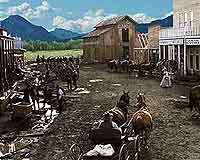 This movie wasn’t as long as some of your other ones! Was there a reason for that?! ”Yeah, well, if you’ve got to get a movie down to a certain time then some things have got to go! And they were like, ‘You choose, Kev! Just get it down to two or so and we don’t care how you do! You just take out whatever you want!’ And I’m like, ‘Oh, I see. You’re gonna let me still be the Director, but you’re basically gonna have me throw out my third child. This isn’t f**king ‘Sophie’s Choice’!” he laughs again.
This movie wasn’t as long as some of your other ones! Was there a reason for that?! ”Yeah, well, if you’ve got to get a movie down to a certain time then some things have got to go! And they were like, ‘You choose, Kev! Just get it down to two or so and we don’t care how you do! You just take out whatever you want!’ And I’m like, ‘Oh, I see. You’re gonna let me still be the Director, but you’re basically gonna have me throw out my third child. This isn’t f**king ‘Sophie’s Choice’!” he laughs again.
Finally, sum up making westerns as a whole ”They’re high entertainment, but hard to make,” he laughs for the final time.
Interviewed by Russell A. Trunk
Get the soundtrack now at:
www.hollywoodrecords.com
To win a Brand New AUNTOGRAPHED copy of the 'Open Range' soundtrack, just answer this question! In which movie did Kevin Costner star as the character, John Dunbar? Now, just send an e:mail to me with the subject title 'KEVIN' and the answer in the text to:
exclusivemagazine@flash.net
Back To Archives

